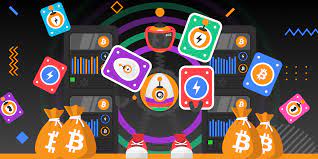In the ever-expanding world of cryptocurrency, decentralized sunswap exchanges (DEXs) have gained significant traction, offering a way to trade digital assets without relying on centralized intermediaries. Among the growing number of DEXs, SunSwap has emerged as a noteworthy player, contributing to the evolving decentralized finance (DeFi) ecosystem. Let’s delve into what SunSwap is, its key features, and how it is shaping the future of crypto trading.
What is SunSwap?
SunSwap is a decentralized exchange built on the TRON blockchain, designed to enable fast, low-cost token swaps in a fully decentralized manner. Like many DEXs, SunSwap allows users to trade various tokens directly from their wallets, without the need to rely on centralized platforms. This provides greater autonomy to users and reduces the risk of hacks, as there is no central entity holding users’ funds.
SunSwap leverages the power of smart contracts to facilitate trades, ensuring that transactions occur securely and transparently on the blockchain. Users can swap a wide array of tokens on the TRON network, benefiting from its high transaction speed and low fees compared to other blockchains like Ethereum.
Key Features of SunSwap
- Liquidity Pools and Yield Farming: SunSwap incentivizes liquidity providers through liquidity pools, where users can deposit their assets and earn a share of the platform’s trading fees. The platform also offers yield farming opportunities, enabling users to earn additional rewards by staking their assets in specific pools. This encourages participation and helps enhance the liquidity on the platform.
- Cross-Chain Swaps: While SunSwap primarily operates on the TRON blockchain, it integrates with other networks through bridges, allowing for cross-chain token swaps. This feature enhances its utility by offering users access to a broader range of assets beyond the TRON ecosystem. It also promotes interoperability between various blockchain networks, which is a key component of the broader DeFi vision.
- User-Friendly Interface: One of SunSwap’s standout features is its easy-to-use interface. The platform is designed to cater to both beginners and experienced traders, providing an intuitive layout for seamless navigation. Users can quickly access the token swap function, liquidity pools, and other essential features with minimal hassle.
- Low Fees and Fast Transactions: Built on the TRON network, SunSwap offers some of the lowest transaction fees in the industry, making it a cost-effective option for traders. With TRON’s ability to process transactions at high speeds, SunSwap ensures users don’t experience delays or high gas fees, which are often common with other networks like Ethereum.
- Security and Transparency: SunSwap operates through smart contracts, which are open-source and audited to ensure they meet high security standards. The decentralized nature of the exchange also means that users have full control over their funds. The transparent nature of blockchain technology provides an additional layer of trust, as users can independently verify transactions and contract operations.
How Does SunSwap Compare to Other DEXs?
When compared to other well-known decentralized exchanges, such as Uniswap and SushiSwap, SunSwap offers some unique advantages. Primarily, the use of the TRON blockchain gives it a significant edge in terms of speed and transaction costs. While Ethereum-based DEXs often suffer from high gas fees during periods of network congestion, SunSwap’s low-fee model makes it an appealing alternative for traders looking to minimize costs.
Another distinguishing factor is SunSwap’s integration with TRON’s DeFi ecosystem, which includes various protocols and projects that can enhance the user experience. This tight-knit integration allows SunSwap users to benefit from the broader TRON DeFi landscape, making it a strong contender in the decentralized exchange space.
The Future of SunSwap
As the DeFi space continues to grow, SunSwap’s future looks promising. The platform is focused on enhancing its functionality, offering more cross-chain features, and expanding its token offerings. Additionally, the development of decentralized governance could further empower the SunSwap community, giving users the ability to propose and vote on platform upgrades.
With the increasing adoption of DeFi solutions and the rise of TRON’s blockchain technology, SunSwap is poised to play a crucial role in the evolving landscape of decentralized finance. Its commitment to providing fast, affordable, and secure trading experiences positions it as a notable alternative to other major DEX platforms.
Conclusion
SunSwap stands as a dynamic example of the power of decentralized finance, offering users an easy-to-navigate platform with low fees, fast transactions, and multiple features that enhance the DeFi experience. With a focus on liquidity pools, yield farming, and cross-chain compatibility, SunSwap is not just a decentralized exchange; it’s a key component in the growing TRON DeFi ecosystem. As blockchain technology continues to advance, platforms like SunSwap will play a pivotal role in the future of cryptocurrency trading, making it a project to watch closely in the coming years.





